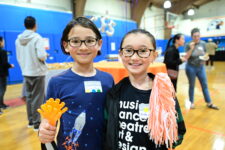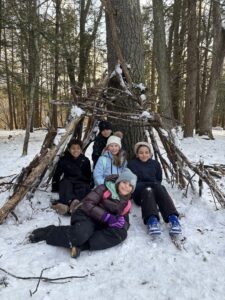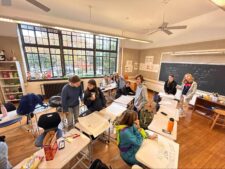How does ECFS define belonging and inclusion?
Inclusion is the act or practice of making everyone feel welcomed, respected, and valued for who they are. It is central to Ethical Culture Fieldston School’s mission of teaching all of our students to approach the world with empathy, compassion, and understanding. Belonging is the feeling of being accepted and valued as a member of the ECFS and greater community. At ECFS, we reinforce the importance of belonging and inclusion so that we can create an environment in which our students can truly thrive – and one that prepares them to engage actively and thoughtfully with the world around them.
What is the School’s historical commitment to belonging and inclusion?
Compelled by a commitment to ethics and progressive pedagogy, Ethical Culture Fieldston School’s founder Felix Adler emphasized moral education, psychological development, and integration of the creative and manual arts with academics. The School, coeducational and integrated from the start, continues to serve a varied community that strives to have inclusion reflected in all programs.
Adler strongly believed in interrelatedness — the notion that every person impacts the lives of those around them. Our ethics and inclusion curriculum and program affirm this belief. Students are taught how to articulate the actions we can take to create a fairer and more just world. These are life lessons that we hope will develop critical thinkers and compassionate leaders in the world around them.
What does belonging and inclusion work look like for students at ECFS?
In classrooms through curriculum, in assemblies and other programming, and in various clubs and resource groups, the Department of Belonging and Social Impact (BSI) works with students to support their growth and development as they continually explore their identity and connections with others in an age-appropriate manner.
At Fieldston Lower and Ethical Culture, we have a structured program called CARe, which is one of many opportunities that children have to talk about identity and ethics in school. Students spend about 45 minutes each month in their CARe groups and then have an opportunity to meet together with their class or grade to share and talk about their experiences afterward. We also offer other resource spaces for students — for example, Students of Color, Jewish students, and students thinking about their gender identity. Our goal is to support the healthy identity development of all of our students.
Our goal is to support the healthy identity development of all of our students.
We are proud to be one of the only schools in New York City to start these inclusive conversations at such an early age. Research shows that by the age of three, children are actively involved in sorting their world and are keenly aware of differences. Supporting children in their awareness of each other’s similarities and differences and connecting them positively to their own identity is essential in helping them grow into confident, compassionate, and healthy young adults. At Fieldston Middle and Fieldston Upper, we offer a series of resource groups for students to form community with other students who share their experiences and identity.
Students are also encouraged to participate in conferences and leadership opportunities outside the School community that focus on principles of inclusion and belonging.
Who leads belonging and inclusion work at the School?
Each of the four divisions has dedicated, full-time BSI Leads who work with the School’s faculty, staff, students, parents, and Board of Trustees. The Department of Belonging and Social Impact members serve as leaders in promoting and developing the School’s capacity to create and sustain an inclusive and supportive community. The team is charged with working on a divisional and an all school level to oversee the development of social and academic programs designed to support all constituents.
The BSI team’s impact on the school is comprehensive. They consult on curriculum; plan school-wide belonging-related programming like assemblies, events, and professional development for staff and faculty; train resource group facilitators to lead identity development work; collaborate with the Ethics and Tech teams to provide responsive community programming; serve on divisional leadership teams and student support teams; participate in the hiring process; organize youth leadership conferences; and support our students as they define their role in their community.
What are belonging and inclusion learning goals?
The inclusion and belonging team is dedicated to promoting the four goals for anti-bias work, according to writer Louise Derman-Sparks. We seek to support students who are comfortable with the following concepts:
- Identity — Students will understand the multiple facets of their identities, know where those traits come from, and feel comfortable being themselves in a variety of settings.
- Connection — Students will be able to identify differences and commonalities, express interest in the lived experiences of others, and develop genuine connections with others.
- Justice — Students will be aware of discrimination and injustice, both individual and systemic, will understand the short and long-term impact of injustice, and will know about those who have fought for more fairness and justice in our world.
- Action — Students will feel confident that they can make a difference in society and will commit to taking action against bias and injustice even when it is not popular or easy.



